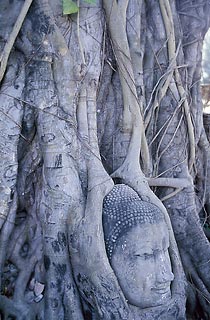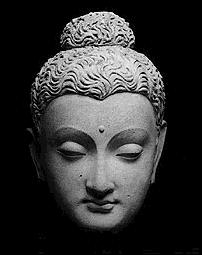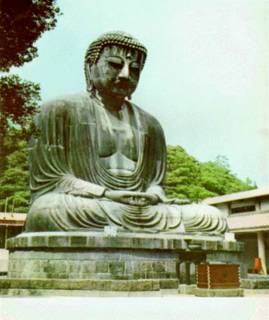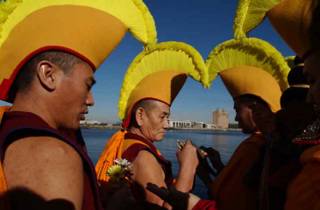Questions of Faith, Part VIII
This installment is by yours truly. I hope you find it enlightening... and if you find errors they are entirely mine; evidence of my poor scholarship, that should in no way reflect badly on my teachers.
Spelling disclaimer: Since many of the terms I'll be using here are transliterated from Sanskrit, Japanese, and Chinese, the spellings are quite flexible. I have tried to use the most common spellings, but you will no doubt see different spellings of the same words. My apologies for any confusion.
What faith do you espouse?
I am Buddhist. There are many flavors of the Path Buddha, but these responses are based mostly on my study of Zen Buddhism, as taught in the U.S. by Robert Aitken Roshi, Philip Kapleau Roshi, and many others.
Who was the founder of your faith? When did he/she live?
Technically, the term "Buddha" simply means, "awakened one" or "one who thus comes" and there have been many Buddhas, and there will be many more. However, when we refer to THE Buddha we are usually speaking of Siddhattha Gotama, a prince born to the Shakya clan around 623 B.C. in the Lumbini Park at Kapilavatthu, an area that is now on the border of Nepal in India. He is also commonly called Shakyamuni, which means, "Sage of the Shakya Clan."
Shakyamuni Buddha
There are many fine books, movies, and websites that tell the Buddha's life story, so I won't try to do it here. The key elements are that at 29 he left home to seek a cure for the affliction of suffering, he tried many different ascetic practices, and eventually he discovered the "Middle Way", which he later expounded as "the Noble Eightfold Path" that is the core of Buddhism.
What are the sacred texts of your faith?
There are many. The Buddha himself did not write anything, but his disciples began to commit his teachings to paper (well, to leaves, actually...) after his death because they feared they would be lost. There are also writings that are not teachings of the Buddha but were penned by later masters, that are also considered a part of the cannon of Buddhist scripture. 
Tibetan boys study the sutras
There are three main schools of Buddhism - Theravada, Mahayana, and Vajrayana - and they each emphasize different writings.
Theravada
Main scriptures: The Tipitaka
Most Popular: The Dhammapada - The Sayings of Buddha (one of my favorites)
Mahayana (this includes Zen)
Main scriptures: The Sutras (sacred texts)- 2184 sacred writings.
Most Popular: The Lotus Sutra - A sermon by the Buddha on the Bodhisattva, buddha-nature, etc.
The Perfection of Wisdom Sutra (Prajna-paramita)- Describes emptiness and other key philosophical concepts.
The Heart Sutra- Describes nirvana, emptiness, and Ultimate Reality.
The "Land of Bliss" Sutra - Describes the Pure Land of Amitabha Buddha.
Vajrayana
Main Scriptures: The Tantric texts and commentaries- Deals mainly with Ultimate Reality as singular Unity, and the sexual union of world (male) and cosmos (female).
Most Popular: Great Stages of Enlightenment - Deals with ethical behavior and control of mind.
Tibetan Book of the Dead - Deals with stages of dying, death, and rebirth.
What is the central teaching of your faith?
The Buddha's teachings are deceptively simple. The whole of Buddhist philosophy is summed up in...
The Four Noble Truths
1)Suffering exists - sometimes translated as, "To live is to suffer."
2)Suffering arises from attachment to desires - or, "We suffer from our wants."
3)Suffering ceases when attachment to desire ceases - "It is possible to end suffering."
4)Freedom from suffering is possible by practicing the Noble Eightfold Path - "The end to suffering is the Noble Eightfold Path."
and
The Noble Eightfold Path
Right Understanding
Right Thought
Right Speech
Right Action
Right Livelihood
Right Effort
Right Mindfulness
Right Meditation
I feel that I should clarify something right here, before it becomes a problem for you. Most Western readers latch onto the third noble truth and say, "this is impossible! I'll never be free from my desires - in fact, I LIKE my desires, so Buddhism is not for me." What they are missing is that the Buddha never said we should give up desire - partly because he knew that was impossible. He simply said we can stop suffering from it. By practicing the Eight Fold Path, we can feel desire without being attached to it.
As for the specifics of the Eightfold Path, again I will defer to the many fine texts on the subject. A basic primer can be found here.
How does your faith define sin? What are the major sins, and how is
one absolved?
If you search a database of Buddhist texts, you are unlikely to find the word "sin" unless the translator is trying to present Buddhism in Judaeo-Christian terms. There are simply actions that lead toward Enlightenment, and those that do not.
That is not to say that there is no code of ethics in Buddhism - there is, and it is summed up in the Eightfold Path. Individual schools of Buddhism have written lists of rules to make it easier for followers, but they are all just rewordings and logical extensions of the Eightfold Path. These vary greatly in specificity. Where Zen has its Ten Grave Precepts, the Thai Forest Monks adhere to the Vinaya - a core of 227 Paatimokkha rules, together with many other ordinances for the right living and harmony of the community of monks.
Buddhists generally don't think in terms of absolution. Because most Buddhists believe in karma, it is attonement that matters most. In a gross oversimplification of the doctrine of karma, I'll simply put it this way - Evil deeds are balanced or erased by good deeds. As Mark once said to me, "Karma is like moral gravity."
Roughly how many adherents does your faith have?
Around 350-360 million - about 6% of the world's population. An increasing number of them reside in the West.
What are the practices of your faith? (Daily, weekly, etc.)
The practices vary for each school, but the common thread is meditation. Because this was the method by which the Buddha achieved enlightenment, meditation is considered the primary practice of most schools of Buddhism. 
This is the posture of zazen (seated meditation)
In Zen, it is called zazen, meaning "seated meditation," and it is referred to casually as "sitting." I thought I'd clarify this point because it can sound very odd to those outside the practice. This coversation is an example;
"What did you do yesterday?
"I sat."
"Cool. I wish I had time to sit more. I sat last week at the Zendo (Zen temple). My sitting was so poor they used the kyosaku ("encouragement stick") on me."
"I've been spending more time on my sitting, and I think it's helped. I sat very well yesterday."
That sounds perfectly normal to a Zen Buddhist, but it has been the cause of more than a little confusion with my family. My grandmother never understood how I could go to the Zendo and "pay for the priveledge of sitting on their cushions."
Most Zen practitioners try to sit daily. Some like to sit twice a day, in the morning and evening. Average duration is about 25-30 minutes per session. A person living in a monastic setting may sit as much as 6 hours per day during the regular periods of the year, and up to 12 or 14 hours per day during the one week intensive periods called sesshin. The biggest sesshin of the year is called Rohatsu, and it commemorates the Buddha's enlightenment. It is normally held in December.
One important note on sitting. Anyone can sit. You do not have to consider yourself a Buddhist, or renounce your current path. Many faithful adherents of other faiths find Buddhist meditation to be a usefull adjunct to their own practices. One of the Roshis at the Zendo in L.A. that I used to attend is also a practicing Rabbi, so clearly there are no prohibitions on practicing other religions at the same time.
What does your faith teach about the afterlife? Is there heaven, and
how do you get there?
Most Buddhists believe in reincarnation, and also in escaping the cycle of death and rebirth. There are voluminous treatises on this esoteric area of Buddhist philosophy, but Zen Buddhists have taken a very practical approach to it. We belive that although you may have had many thousands of previous lives, and you may have many more to come, the one that matter most is THIS ONE. Time spent speculating about karma, past and future incarnations, and all the other logistical and metaphysical ramifications of reincarnation is time that COULD have been spent sitting!
How is your faith organized? Are there priests and bishops and
archbishops (oh my!)?
In America the organization of Zen is very loose. It is based on lineage, so temples usually are identified by the Master who founded them, and any famous or important teachers in that Master's lineage. Because most temples in America are relatively young (less than 30-40 years) the lineage usually only goes back one generation. In Asia, it is another story. The recitation of lineage can take quite a while, and monks pride themselves on being able to recount the history of their monastery back into the mists of antiquity.
The only really important titles in Zen are Roshi and Sensei. Roshi means "old teacher" and denotes a fully realized master - that is, one who is fully enlightened. Sensei refers to teachers who may have had an enlightenment experience, but whose vision is still maturing. These titles are conferred after examination by an existing Roshi.
Are there regular services available to you locally? If so, where?
There is a sitting group in Laramie, but I have been told that they are practicing in the Theravada style, not Zen. There is a tiny little Zendo down in Fort Collins that I used to sit at every morning, and it is affiliated with a big Zendo in Denver, but both are a bit of a drive for daily practice.
There has been talk of starting a regular sitting group for the Flock... let me know if you are interested.
How did you come to be a believer?
One of the beauties of Buddhism is that belief is not essential. Try it - if you find that it helps, keep doing it. That's what happened to me. I tried seated meditation and liked the way I felt afterwards. I was calmer, clearer, and more focused, so I kept doing it. Nothing fancy, no thunderous religious expereince - just a simple assessment of the results.
What do you wish others knew about your faith?
We do not worship the Buddha as a god. He was a human - in fact, only humans can become Buddhas.
We are not all bald monks.
We are not all vegetarians.
We are not all martial arts masters (although that would be cool...).
Buddhists have the best hats...
Subscribe to:
Post Comments (Atom)




0 comments:
Post a Comment